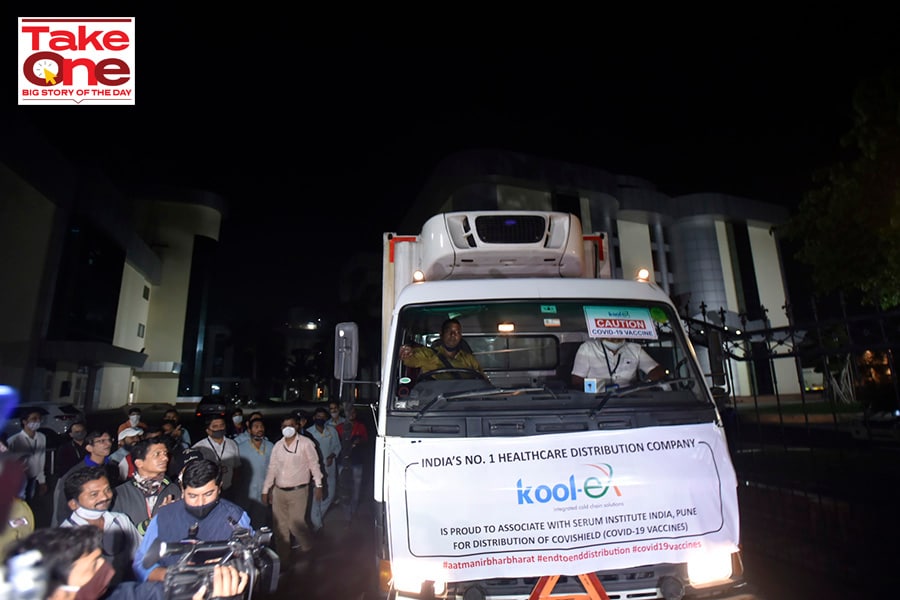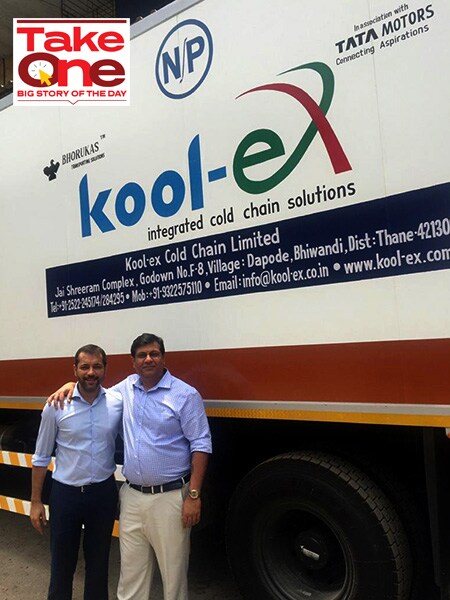Kool-ex: The Covid-19 vaccine transit hero
As India gets ready to vaccinate millions, the little-known logistics company has emerged as a transporter of choice for pharma companies


 First Covishield vaccines consignment leaves Serum Institute, Pune
First Covishield vaccines consignment leaves Serum Institute, Pune
For Kunal and Rahul Agarwal, January 12 isn’t just another day.
Eight years after the siblings decided to take their family-run business into uncharted territories, they can finally heave a sigh of relief.
That’s because, on January 12, Kool-ex, a company they own became the first transporter in India to ferry the first batch of the long-awaited Covid-19 vaccine, intended to vaccinate millions of Indians, from Serum Institute of India’s (SII) manufacturing facility in Pune to the city’s airport.
SII is currently mandated with supplying over 30 crore vaccine doses to the Indian government, and the first consignment of these—478 boxes, each weighing 32 kg—were loaded onto three trucks meant for 13 cities. “We carried the first consignment to the airport,” says Kunal. “We will then pick it up at the destination airports and move it forward to the final destinations.”
Through the day, six more trucks will leave the SII’s manufacturing facility for numerous destinations across the country. “These will go up north,” Kunal adds. The movement will take place after a small ceremony at the facility.
The trucks, escorted by armed police vehicles, are equipped with GPS and will be monitored real-time by the brothers, who can track everything from the temperature inside the trucks to the opening of their doors. “We are excited at being deemed capable enough to serve the nation as we had to undergo a stringent quality approval process,” says Rahul, managing director at Kool-ex. “It"s something very prestigious for us.”
With over 10 million Covid-19 cases, India is the world’s second worst hit country. To provide some reprieve from the crisis, the Indian government will begin vaccinations with Covishield, a vaccine developed by AstraZeneca and manufactured by Pune-based SII, from January 16.
“Only about 2.5 crore people have been vaccinated globally so far,” Prime Minister Narendra Modi said on January 11. “We’ve to achieve vaccination of 30 crore citizens in the next few months.” India"s finance ministry recently released Rs 480 crore toward Covid-19 vaccinations, and the sum has been disbursed to states according to the number of beneficiaries they will vaccinate in the first phase.
Kool-ex isn’t the only logistics company that SII has partnered with many others are expected to play a role in the future. However, it remains the first one to transport the vaccines. “As of now, our role is only to move the vaccines from the primary manufacturer,” says Kunal. “We"ve been doing this business for quite some time, and we have been transporting all sorts of vaccines across temperature ranges throughout India.”
For the Covid-19 vaccine delivery, however, the company did not sign any new contract with SII. “There is no new contract,” Kunal says. “We have long-standing contracts with these companies. We have been transporting vaccines for long, and this is all part of the same contract.” Kool-ex will also be transporting the indigenously developed Covid-19 vaccine, Covaxin, of Bharat Biotech, and ZyCov-D, the Covid vaccine developed by Zydus Cadilla, which is in its phase 3 trials.
“We are a niche pharma trucking player,” says Rahul, on why they were chosen as the preferred transporter. “There"s a huge difference between the cold chain movements for pharma versus other sectors because there is a risk of contamination for anything that is medical. So usually, any pharma company would straight away reject any truck or asset that has been used for non-pharma purposes.”
For now, Kunal is tight-lipped about the final destinations of the trucks that number around 400. “The government has defined a structure as of now,” he says. “There are going to be several government depots where the manufacturer has to send these vaccines. From there on, the government would be handling the movement of secondary and last-mile sections.”
 From left: Kunal Agarwal, director and Rahul Agarwal, the managing director of Kool-ex
From left: Kunal Agarwal, director and Rahul Agarwal, the managing director of Kool-ex
Tracing roots to India’s independence
Kool-ex, the Agarwals say, traces its roots to 1946.
It was then that their grandfather and his brothers forayed into trucking, starting with one truck that they drove across the country. “They realised there was huge potential for trucking and the movement of goods, and the economy was just starting out,” says Kunal. “Over time, the business grew big and diversified. They had separations, which is natural with many businesses.” The original trucking business, Transport Corporation of India (TCI), continues to flourish under a different faction of the family, and continues to be a competitor for the Agarwal brothers.
By 1996, Rahul, Kunal and their father set up Bhoruka Logistics, which continued to dabble in the logistics business. Bhoruka, Kunal says, is the family name, under which numerous businesses have been built, including in the steel and gas sectors, all controlled by various factions of the extended family.
In 2012, Rahul and Kunal decided to focus on the cold chain, and more specifically the pharmaceutical business, and today it boasts a clientele that includes India’s biggest pharmaceutical companies. “Since 1996, we have been handling pharmaceutical companies,” Kunal says. “We were trying to figure out how to add value to the trucking business.”
Pharma cold chain logistics contribute about 70 percent of the company"s revenues. In 2019, Kool-ex had revenues of Rs 61.62 crore as against Rs 29 crore in 2018. Profits in FY19 stood at Rs 89.67 lakh in comparison to Rs 22 lakh FY18. In 2019, the company also entered a strategic tie-up with Tata Motors and Tata Motors Finance Group to purchase 200 fully built reefer trucks manufactured by Tata Motors, in exchange for equity financing.
Today, Kool-ex claims to be the owner and operator of the largest pharma-dedicated reefer fleet in India, with a pan-India network of over 800 cities.
“We own and operate around 400 such trucks, and they can have temperatures of -25 degree Celsius to 25 degree Celsius and are enabled in terms of GPS and temperature tracking,” Kunal says. “Apart from that, we can source another 600 at will.” For now, the Agarwal brothers reckon that the demand for trucks may not be very high, particularly since vaccine manufacturers are only beginning to ramp up production. “The build-up is going to be slow,” he says. “This is going to be a slow process because even the manufacturers have to manufacture. That"s why they have to be quality approved and it"s a process that even the manufacturers understand.”
India’s vaccination roadmap
India will begin nationwide vaccinations from January 16.
The Ministry of Health and Family Affairs has targeted the inoculation of about 30 crore people on priority. This includes about 1 crore health workers and 2 crore frontline workers. This will be followed by senior citizens above 50 years of age (as of January 1, 2021), and those below 50 who have serious comorbid conditions. This segment includes about 26 crore people.
In a meeting with states and Union Territories on January 11, Modi said that the Centre will bear the cost of inoculating 3 crore health care and frontline workers, who will be vaccinated in the first phase. Modi added that while vaccinating 30 crore people will be a huge task, “systems are in place to make our vaccination programme a success”.
While health care workers are defined as health care providers and workers in health care settings, personnel from state and central police departments, armed forces, home guards and civil defence organisation, including disaster management volunteers and municipal workers, are categorised as frontline workers. The data for these essential workers are ‘pre-populated’ or captured in the Co-WIN digital platform launched by the government. This platform is now being expanded to include other beneficiaries of the Covid-19 vaccine.
After being vaccinated, beneficiaries will receive an SMS notification with details of the dosage, followed by the date and time for the subsequent dose. They will also be provided a digital certificate with a QR code. By the time of writing this article, Union health minister Harsh Vardhan had said that around 75 lakh beneficiaries had registered on the Co-WIN platform.
The rollout of the vaccine will follow the election model. Approximately 100 people are expected to get vaccinated at a single session site at a time, with a five-member team of experts to monitor them at each stage, including checking registration status, authenticating and verifying documents, administering vaccines and managing the crowd. Additional teams will be deployed, Vardhan said, if there are more than 200 people.
“Delhi airport is working with other stakeholders in the supply chain, including pharma companies, airlines, forwarders, and temperature-controlled transport service providers for efficient, reliable, uninterrupted services to end users,” said a spokesperson for the Delhi International Airport Limited (DIAL) to Forbes India in an email, explaining that India’s busiest airport, whose two integrated cargo terminals have an annual cargo handling capacity of 1.8 million metric tonnes, has created “separate dedicated gates at the terminals for fast movement of vehicles carrying vaccines in and out of the airport.”
First Published: Jan 12, 2021, 15:24
Subscribe Now